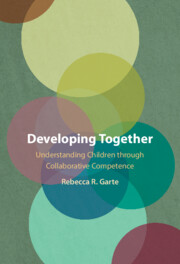Book contents
- Developing Together
- Developing Together
- Copyright page
- Dedication
- Contents
- Figures
- Tables
- Preface
- Acknowledgments
- Part I Collaborative Competence
- Part II Elements of Collaborative Competence
- Part III A New Theory and Method for Assessing Development via Collaborative Competence
- Part IV Implications for Theory, Research, and Practice
- Chapter 11 Making the Shift to Interactivity in Education and Psychology
- Chapter 12 A Theoretical Home for the Role of Collaborative Competence in Education
- References
- Index
Chapter 12 - A Theoretical Home for the Role of Collaborative Competence in Education
from Part IV - Implications for Theory, Research, and Practice
Published online by Cambridge University Press: 07 May 2024
- Developing Together
- Developing Together
- Copyright page
- Dedication
- Contents
- Figures
- Tables
- Preface
- Acknowledgments
- Part I Collaborative Competence
- Part II Elements of Collaborative Competence
- Part III A New Theory and Method for Assessing Development via Collaborative Competence
- Part IV Implications for Theory, Research, and Practice
- Chapter 11 Making the Shift to Interactivity in Education and Psychology
- Chapter 12 A Theoretical Home for the Role of Collaborative Competence in Education
- References
- Index
Summary
This final chapter offers a theoretical paradigm for connecting the various methodological and empirical findings regarding how intersubjectivity serves as a basis for human development and learning via collaboration. Tomasello’s evolutionary account makes the case for the primacy of collaborative competence in the survival and development of the human species. He shows how collective intentionality signals the key distinction between humans and our closest animal relatives – the great apes. His theory and research are used as bases to argue for changing the paradigm that currently defines psychology, especially developmental and clinical fields. Recommendations for how to shift constructs and research in these fields to reflect interactive units of analysis are discussed. The transformative activist stance within cultural historical activity theory bridges psychology and education in its framework for rethinking development. This framework provides a way to argue for an emancipatory form of education that acknowledges the inherently collaborative nature of learning and development.
Keywords
- Type
- Chapter
- Information
- Developing TogetherUnderstanding Children through Collaborative Competence, pp. 221 - 232Publisher: Cambridge University PressPrint publication year: 2024



